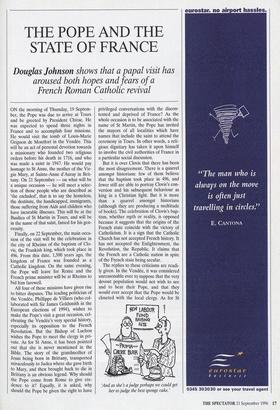THE POPE AND THE STATE OF FRANCE
Douglas Johnson shows that apapal visit has aroused both hopes and fears of a French Roman Catholic revival
ON the morning of Thursday, 19 Septem- ber, the Pope was due to arrive at Tours and be greeted by President Chirac. He was expected to spend three nights in France and to accomplish four missions. He would visit the tomb of Louis-Marie Grignon de Montfort in the Vendee. This will be an act of personal devotion towards a missionary who founded two religious orders before his death in 1716, and who was made a saint in 1947. He would pay homage to St Anne, the mother of the Vir- gin Mary, at Sainte-Anne d'Auray in Brit- tany. On 21 September — on what will be a unique occasion — he will meet a selec- tion of those people who are described as 'the excluded', that is to say the homeless, the destitute, the handicapped, immigrants, those suffering from Aids and children who have incurable illnesses. This will be at the Basilica of St Martin in Tours, and will be in the name of that saint, famed for his gen- erosity.
Finally, on 22 September, the main occa- sion of the visit will be the celebration in the city of Rheims of the baptism of Clo- vis, the Frankish king, which took place in 496. From this date, 1,500 years ago, the kingdom of France was founded as a Catholic kingdom. On the same evening, the Pope will leave for Rome and the French prime minister will be at Rheims to bid him farewell.
All four of these missions have given rise to bitter disputes. The leading politician of the Vendee, Phillippe de Villiers (who col- laborated with Sir James Goldsmith in the European elections of 1994), wishes to make the Pope's visit a great occasion, cel- ebrating the Vendee's very special history, especially its opposition to the French Revolution. But the Bishop of Luchon wishes the Pope to meet the clergy in pri- vate. As for St Anne, it has been pointed out that she is never mentioned in the Bible. The story of the grandmother of Jesus being born in Brittany, transported miraculously to Judea where she gave birth to Mary, and then brought back to die in Brittany is an obvious legend. Why should the Pope come from Rome to give cre- dence to it? Equally, it is asked, why should the Pope be given the right to have privileged conversations with the discon- tented and deprived of France? As the whole occasion is to be associated with the name of St Martin, the Pope has invited the mayors of all localities which have names that include the saint to attend the ceremony in Tours. In other words, a reli- gious dignitary has taken it upon himself to involve the civil authorities of France in a particular social discussion.
But it is over Clovis that there has been the most disagreement. There is a quarrel amongst historians: few of them believe that the baptism took place in 496, and fewer still are able to portray Clovis's con- version and his subsequent behaviour as king in a Christian light. But it is more than a quarrel amongst historians (although they are producing a multitude of books). The celebration of Clovis's bap- tism, whether myth or reality, is opposed because it suggests that the origins of the French state coincide with the victory of Catholicism. It is a sign that the Catholic Church has not accepted French history. It has not accepted the Enlightenment, the Revolution, the Republic. It claims that the French are a Catholic nation in spite of the French state being secular.
The replies to these criticisms are readi- ly given. In the Vendee, it was considered unreasonable ever to suppose that the very devout population would not wish to see and to hear their Pope, and that they would ever accept that the Pope would be closeted with the local clergy. As for St And as she's a judge perhaps we could get her to judge the best sponge cake.' Anne, it should be remembered that every year three quarters of a million people visit her Basilica and that on her feast days some 20,000 attend her church. She is a Breton saint who is associated with the sea and with death. The story of her apparition to the peasant Yves Nicolazic in 1623 and the discovery of her statue two years later are amongst the most precious symbols of Breton history. That the Pope should meet some of the unfortunates of France is in accordance with Christian tradition, and that he should do so in the name of St Martin, the most popular of all the saints, is quite appropriate.
And whilst one might argue about the details of Clovis's conversion, it is claimed that no one can deny its importance. Clo- vis established himself in Paris. At the time of his death in 511 he was no longer a bar- barian princeling but the ruler of a king- dom which stretched from the Pyrenees to well beyond the Rhine. It was he who began the fusion of the remnants of Rome with Germanic influences which led to the synthesis of Frankish Gaul. In these cir- cumstances, the adoptation of Christianity by the Franks was of great importance. Even if one is unenthusiastic about Catholicism, the conversion of Clovis is seen as a vital stage in French history. An English historian wrote, some 60 years ago, that with this baptism one seemed to hear 'a premonitory blast of the trumpet which called Frankish chivalry to the Cru- sades, sounded the knell of the Albigensian heretics and led to the Huguenot emigra- tion from France in the 17th century'.
It is pointed out that such an important occasion is to be celebrated not only by a Papal visit and a Papal mass, but also by a series of seminars that will bring hosts of historians together, by artistic and archae- ological exhibitions, by theatrical and architectural displays. This is, say the organisers, an event in the cultural life of the nation. A survey has shown statistically that in what is called cultural tourism reli- gious sites have a constant and consider- able success.
The 12 million annual visitors to Notre Dame de Paris may not be a surprise, but who would have thought that well over two million people a year visit the Chapelle de la Medaille Miraculeuse? It is argued that if this year more French peo- ple have spent their holidays in western France rather than in the south, it is because they have been attracted to French civilisation and to French history, more evident in the west than on the beaches of the Mediterranean. The French may not be religious in the sense of attending mass, but they want a reli- gious culture. They may not be well- informed about history, but they need an historical culture.
A nation is a memory. An event is iso- lated and idealised — this is selective histo- ry. It can be misleading, but the French always do it. The great events of French history illuminate the present both in terms of names and dates; but they do so for a purpose, and one has to ask what the pur- pose is in the case of Clovis.
When Clovis's baptism was celebrated in 1896, France was dominated by reactionary politics. The separation of Church and state had yet to be decided. Dreyfus was still on Devil's Island and the authorities were determined that he should stay there. But in 1996? There are those who believe that the separation of Church and state is in danger. A Socialist president is buried according to Catholic rites in a national ceremony. Will the next president be sworn in to the accompaniment of a Te Deum? And then there are those who hope that this ceremony will be the sign of a moral revival, in a country riddled with corrup- tion, dominated by the worship of money and suffering from the collapse of moral values. They believe that there are already signs of greater fraternity amongst people. Both views may be mistaken. Perhaps all this is simply a storm in a baptismal font. But one thing is clear, the disputes are entirely French. Although Clovis had Ger- man connections, Europe is absent.
The author is Professor Emiritus of French history at London University.



















































































 Previous page
Previous page